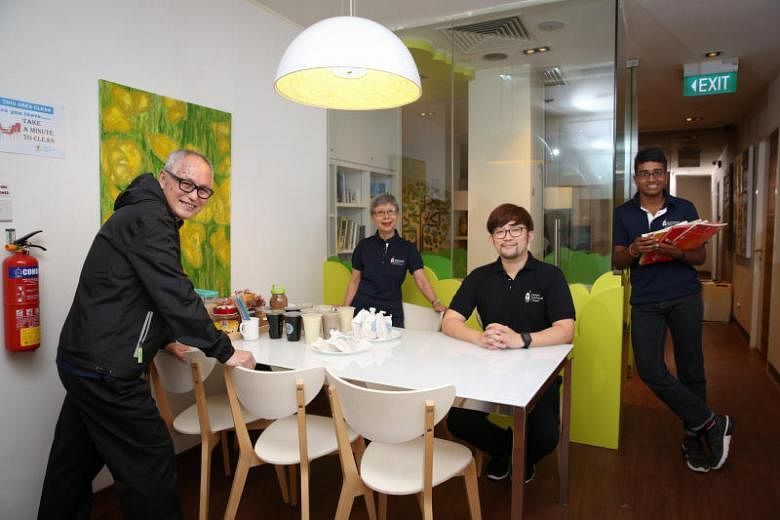SINGAPORE - Walking along the corridors leading to the children's intensive care ward at the National University Hospital (NUH) fills Darren Ng, 43, with so much dread that he keeps his gaze down and stares at the floor.
The corridors remind him of the time in 2016 when his 12-year-old daughter was found to have a rare blood disorder and almost did not make it out of the hospital alive.
But the unpleasant memory has not stopped Mr Ng from returning to volunteer at NUH, thrice a week last year and once a month this year. He helps maintain the "four-room flat" that the hospital offers as a place of rest to the loved ones of gravely ill children.
Mr Ng, who works in a fintech company and has two children, said: "The day my daughter was discharged, I decided to come back as a volunteer to help run the place and encourage other caregivers by sharing my experiences.
"But it took me eight months before I found the courage to sign up and return as a volunteer."
Over the last five years, the Ronald McDonald House has been a place of respite and refuge for a total of about 1,120 family members of critically ill children.
"In addition to providing a place of respite, we hope they find in this house a sanctum where they can retreat to have privacy, quiet time and recuperate from the long hours of keeping vigil by their children's bedside," said Associate Professor Daniel Goh, chair of the paediatric cluster at NUH.
"When parents are physically recharged and mentally refreshed, they are in a better state to continue to care for their child," he said.
The house is funded by Ronald McDonald House Charities (RMHC) Singapore and donations from the public.
The house - a short walk down the hall from NUH's paediatric and children's wards - has four en suite bedrooms, a living and dining room, kitchen, play area and laundry room.
There, parents can sleep or shower while they keep a vigil over their children nearby. Residents, on average, stay there for 12 days.
RMHC opened a similar rest facility, but without beds, recently at the Institute of Mental Health.
At the NUH facility, 80 volunteers take turns to register new occupants daily, keep the place tidy and stocked with food and drinks, as well as provide a listening ear to distressed caregivers.
Mr Ng helps to change and wash the bed linen, and buys food.
He had stayed in the house for a month in 2016, sleeping for just two hours a night and spending the rest of the time by his daughter's bedside. She was in a coma for a week, with her platelet count decreasing rapidly and her heart rate soaring dangerously high.
He was overwhelmed by despair then, and had suicidal thoughts.
As a volunteer now, Mr Ng befriends caregivers, shares his experiences and listens to them. He gives some of them books to read at night and visits their children in the wards.
National serviceman Alagan Gnanam, 19, who is one of the youngest volunteers, does a four-hour shift every Friday night after he books out from camp.
He said: "I see how jovial some family members can still be despite their children's condition. A father specially baked vegetarian mooncakes for us. These are the little things that motivate me to come."
Another volunteer Gerard Lee, 69, gets pancakes and soya bean drinks from the eatery downstairs and distributes them to occupants every Thursday.
"I also share my own story with them, get to know the names of their children and pray with them if they want me to," said Mr Lee, who shows up every week with his wife. His brother-in-law and wife are also volunteers.
"We are very touched by the presence of this facility. When my granddaughter was warded, my daughter-in-law could just go over to the ward whenever my granddaughter cried out for her in the middle of the night," he said.
His son and daughter-in-law stayed in the house on two occasions when their daughter, who has a severe heart condition, needed major operations.
Data suggests that a child recovers faster and better if the parents are close by, said Associate Professor Goh, adding that it is "absolutely true" that "love and support is as powerful as the strongest medicine".
Parents, like Mr David S, appreciate the support offered by volunteers of the house.
He has been staying there for the last three months as his eight-year-old daughter has a rare neurological disorder and is in a coma.
"It's been a very stressful time for us and I have only returned home once or twice during this period," said Mr S, who is in his 40s and in sales. He is grateful for his own room, which gives him the space and privacy for his daily prayers and quiet time. He and his wife also use the laundry facilities there.
He said: "What is special is also having the volunteers share their personal stories with us. They remind us about hope, something that is very important when you are at your lowest."




